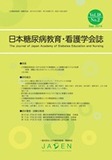Japanese
English
- 有料閲覧
- Abstract 文献概要
- 参考文献 Reference
- サイト内被引用 Cited by
本研究の目的は,2型糖尿病患者に対する外来での看護師による療養支援モデルの効果をランダム化比較試験により検証することである.糖尿病専門クリニックに通院する2型糖尿病患者(平均年齢57.7歳)を介入群と対照群に無作為に割り付け,介入群には4〜6週毎の診療前後に看護師が療養支援モデルに基づく個別面接を15ヵ月間実施し,対照群は通常の外来診療のみとした.食事・運動に関する療養行動,食事療法にかかわるつらさ,HbA1c(NGSP値)を評価指標とし,介入群45名と対照群43名の変化を比較した.その結果,15ヵ月後の介入群の3食栄養バランスは対照群よりも良好で(p=.009),運動量は介入群が対照群よりも増加傾向を示した(p=.098).摂取エネルギー節制,食事時間パターン,食事療法にかかわるつらさ,HbA1cにおいて両群間の有意差はなかった.以上により,外来での看護師による療養支援モデルは食事・運動に関する療養行動に対して部分的に効果があることが示唆された.
Purpose : This research aimed to evaluate the outcomes of a nursing model on self-management education for outpatients with type 2 diabetes.
Methods : A randomized controlled trial was used. Adults with type 2 diabetes (mean age 57.7) receiving outpatient treatment at a clinic specializing in diabetes were divided randomly into an intervention group (n=45) and a usual care group (n=43). The intervention group received individual face-to-face patient education from a nurse using the self-management education model prior to and following their outpatient treatment every four to six weeks over a period of 15months. The outcome measures were changes from the baseline in : score of dietary and exercise self-management, the distress scale related to the diet, and HbA1c (NGSP).
Results : With regard to dietary and exercise self-management, a significant improvement in nutritional balance was seen in the intervention group versus the usual care group. Scores for amount of exercise indicated a trend towards better exercise self-management in the intervention group as opposed to the usual care group. There was no significant difference between the two groups with regard to control of caloric intake, changes in meal time patterns, the distress scale related to diet, and HbA1c.
Conclusions : The nursing model on self-management education showed the partial effectiveness in dietary and exercise self-management.
Copyright © 2014, Japan Academy of Diabetes Education and Nursing. All rights reserved.


